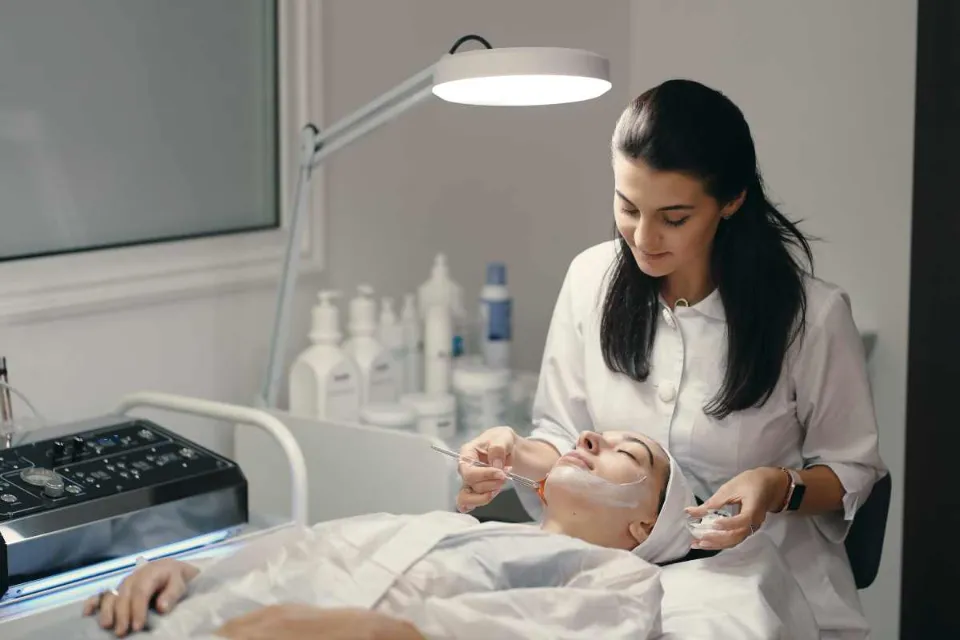Does Health Insurance Cover Dermatologist? All Explored
In this article, we’ll be discussing what dermatology is, what dermatology services are and are not covered by insurance, how to find a dermatologist, and more.
Does health insurance cover dermatologist? A dermatologist visit that is deemed medically necessary is typically fully or partially covered by insurance. Your health insurance provider might classify a variety of skin conditions—from mild acne to skin cancer—as medically necessary.
Continue reading.
Table of Contents
What is Dermatology?
Skin diseases are the focus of the medical specialty of dermatology. Diagnosing, treating, and preventing various skin conditions are the main focuses of dermatology. Cosmetic dermatology and medical dermatology make up the majority of the field of dermatology.
Is Dermatology Medically Necessary Or Elective (Cosmetic)?
Medically necessary is an important term when it comes to health insurance.
- You might be eligible for full or partial coverage for medically necessary healthcare services if your insurance provider agrees with that stance.
- It’s unlikely that you’ll be covered for a healthcare service under a typical healthcare plan if your insurance provider does not deem it to be medically necessary. Instead, it is likely to be deemed an elective procedure. Additionally known as cosmetic procedures, elective procedures are sometimes.
When it comes to dermatology, the terminology can be a little confusing because some procedures that are medically necessary can also make your skin look better on the outside.
Serious dermatology services like those for skin cancer, skin infections, keloid hives, eczema, and warts are typically regarded as medically necessary. Does insurance cover dermatology for acne? Yes, most health insurance plans do cover acne because it’s typically regarded as medically necessary and is especially likely to do so if it’s moderate or severe.
Dermatology services that are usually considered elective include chemical peels, Botox injections, and dermal fillers. These services are seldom covered by traditional health insurance plans, similar to teeth whitening and LASIK.
Every insurance policy varies with regards to which services are considered medically necessary. Make sure you are covered for the services you wish to access by contacting your insurance provider before scheduling an appointment with your dermatologist.

Cosmetic Vs. Medical Dermatology
Cosmetic dermatology describes procedures for the skin that are intended to enhance both its appearance and health. The issue might be brought on by aging, sun damage, or skin scarring. In essence, cosmetic dermatology is used when a patient wants to improve the appearance of their skin but not for medical reasons. Examples of such practices include dermal fillers, DOT therapy, and hair removal.
Medical dermatology refers to skin conditions of a medical nature. Eczema, psoriasis, and skin cancer are examples of this. Your dermatologist will be able to tell you whether your condition requires a necessary medical procedure or an elective cosmetic procedure.
It’s critical to address dermatology-related medical problems as soon as they arise. On the other hand, if the skin procedure you want is cosmetic, you can decide whether to have it done.
In the latter case, the question becomes “is cosmetic dermatology covered by insurance?” Typically, the response is negative. The majority of medically necessary procedures, though, will be paid for by insurance.
What Type of Health Insurance is Best for Covering Dermatology?
There are two main types of health insurance benefit plans:
- HMOs,
or Health Maintenance Organization plans, require you to name a primary care
doctor who coordinates your care. With this type of plan you will have to
receive a referral from your primary care physician in order to see a
dermatologist - PPOs,
or Preferred Provider Organization plans, will typically allow you to have
access to a wider range of treatment providers and covered care than what is
available with HMO coverage. You may not have to receive a referral.
There is no objective “best” type of health insurance for dermatology coverage. To make the most of your available benefits, it’s essential to understand your specific policy.
If getting access to dermatological care is important to you, it might be a good idea to check your plan’s specifics again before enrolling to make sure you have access to and coverage for the care you require.

Do I Need a Referral to See a Dermatologist?
Technically, whether or not you have a referral, you have the choice to see a dermatologist whenever you like.
A referral from your primary care physician is necessary before scheduling an appointment with some healthcare plans, such as HMOs, if you want to be covered.
Be aware that receiving a referral does not ensure that you will be covered; in some cases, in order to be eligible for coverage, you must also visit a specific dermatologist who is part of the approved network of healthcare providers.
How Much Does a Dermatology Visit Cost?
The price of a dermatology visit varies depending on a number of variables, such as the type of consultation you require, the cost of living in your area, and more. You can contact nearby dermatologists even before making an appointment to learn the approximate cost of your consultation.
In the United States, the average cost for a dermatology visit is $221, but that does not mean that you will pay exactly $221 for your visit. Without insurance, you might pay more or less than $221 depending on some of the factors mentioned in the paragraph above. Your insurance company will typically cover the majority, if not the entire cost.
In general, dermatology visits are among the less expensive healthcare services to use because, in many cases, your dermatologist can treat your condition without using any specialized tools. The dermatologist can frequently treat certain conditions, like acne, by looking at your skin and writing a prescription based on what they see.
Are There Ways to Make Dermatology Services Not Covered by Insurance Affordable?
There are a few ways to lower your out-of-pocket expenses if you require a dermatologist visit but lack insurance or if the service is covered by your current insurance plan but not the one you need.
- Use the American Academy of Dermatology’s search toolor the Skin Cancer Foundation’s search tool to find dermatologists in your area. Get price quotes for the services you need by calling each one and asking. For different services, some dermatologists charge more than others.
- Please let the operator know when you call if you don’t have insurance. If your dermatologist is aware that you are covering all expenses on your own, they might give you a discount.
- Similarly, some dermatologists might offer to work with you through payment plans even if they don’t offer a discount. They might give you the choice to break up the cost into a few smaller payments over a longer period of time rather than asking you to pay the entire amount immediately after your appointment.
- You have the choice to look for your own payment plan in the form of a medical credit card if your dermatologist does not provide payment plans. The initial service will cost less out of pocket and therefore be more affordable, but over time you will pay more than you would if you made a lump sum payment due to interest.

Frequently Asked Questions
The following are typical concerns with dermatology and health insurance.
Does Health Insurance Cover Cosmetic Or Aesthetic Dermatology?
No, typically health insurance does not cover medical treatment for cosmetic or aesthetic surgeries except for accidental injuries. The specifics of the dermatology treatments that are covered under the health plan they are providing may require you to speak with the insurer.
Is There Any Waiting Period in Coverage for Dermatology Disorders in Health Insurance?
Yes, there may be a waiting period before you can access healthcare coverage for some dermatological conditions. You might have to wait before the health plan covers the specific treatments if you had a condition like skin cancer or another one before buying the policy.
Is Dermatology Treatment for Ageing Skin Covered in Health Insurance?
As it may be regarded as cosmetic or aesthetic surgery, treatments for aging skin may not be covered by health insurance plans.
Does Health Insurance Cover Dermatology for Hair Loss?
Health insurance may cover hair loss caused by a medical condition, but in most cases, health insurance may not cover hair loss treatment since hair loss is not an emergency medical condition.
Does Health Insurance Cover Lipomas Removal?
It is dependent upon the health insurance strategy you have selected. For more information, please consult your policy document. You can also speak with your insurer to learn more about the specifics of their lipoma removal coverage.
Summary: Does Health Insurance Cover Dermatologist?
- Does dermatology fall under the purview of health insurance? If deemed medically necessary, insurance will typically fully or partially cover dermatologist visits. Your health insurance provider might determine that a number of skin conditions, from mild acne to skin cancer, are medically necessary.
- You might need a recommendation from your primary care doctor and/or to see a dermatologist who is part of the authorized provider network for your health insurance plan in order to be covered for your dermatologist visit.
- The cost of a dermatologist visit is usually somewhat affordable, even without insurance, and you have a variety of options to reduce costs and/or get help paying for costs.
- In particular, if you reside in a underserved or rural area and must wait weeks or months for an appointment, teledermatology may be an alluring alternative to in-person consultations.
- Dermatology services are only covered by Medicare if they are deemed medically necessary, just like they are by private health insurance plans.
- FSAs and HSAs are non-traditional private healthcare options that may pay all or part of your dermatologist’s fees, including consultation copays and any additional prescriptions your doctor may have advised to treat your skin condition.
Tired of intricate insurance policies? In the future, make sure to collaborate with a business that prioritizes the patient’s convenience and is open and trustworthy. When all of your covered services are clearly spelled out, you’ll know exactly what you are and aren’t covered for, saving you time and helping you get the care you need as quickly as possible.
Read about

